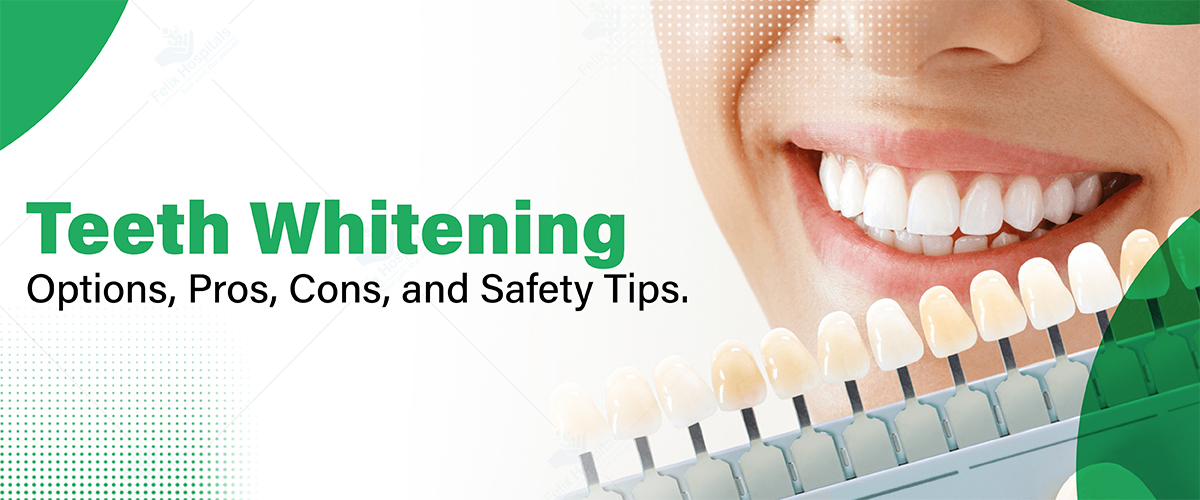
Subscribe to our

A dazzling white smile is a confidence booster for many, but lifestyle factors and aging can dim that sparkle over time. Teeth whitening has become a popular choice for restoring brilliance and tackling discoloration, with options ranging from home remedies to professional treatments. For those seeking a trusted, experienced dental hospital in Noida to explore safe and effective teeth-whitening options, this guide provides the insights needed to make informed decisions.
Book a consultation today with a qualified dentist in Noida for personalized teeth-whitening advice. Call us today at +91 9667064100.
Teeth whitening is a cosmetic dental procedure aimed at lightening teeth and removing stains or discoloration. This process typically involves using bleaching agents like hydrogen peroxide or carbamide peroxide, which penetrate the enamel and break down stains at a molecular level. With various methods available, including in-office procedures, at-home kits, and natural remedies, teeth whitening can effectively lift stains and enhance the brightness of your smile.
Several factors contribute to teeth discoloration, often making whitening a necessity. These include:
Teeth whitening offers several benefits, making it a popular choice for those seeking a radiant smile:
While effective, teeth whitening does have its drawbacks:
Potential for Overuse: Excessive whitening can weaken enamel and make teeth prone to damage or sensitivity.
To achieve safe and effective results, consider these essential tips:
Avoid Staining Foods Post-Treatment: For 24–48 hours after treatment, avoid dark-colored foods and beverages to prevent the re-staining of your teeth.
For those in Noida looking to enhance their smile with expert care, here are the top dental professionals for teeth whitening:
Schedule an appointment by Clicking Here with a top dentist in Noida to explore your teeth-whitening options and find the best fit for you.
Teeth whitening can transform your smile, enhancing both your appearance and self-confidence. However, the procedure requires careful consideration of the options, along with attention to safety guidelines to ensure effective results without harming the enamel. Consulting a skilled dentist is essential, especially for customized recommendations suited to your dental needs.
1. Can teeth whitening remove deep stains from tetracycline or antibiotics?
Ans: Deep stains caused by tetracycline or certain antibiotics may be difficult to remove with standard whitening methods. Dentists often recommend specialized treatments for these types of intrinsic stains.
2. Is teeth whitening safe for people with dental restorations?
Ans: Teeth whitening is generally safe, but it doesn’t affect crowns, fillings, or veneers. Your dentist can advise on alternative approaches for a uniformly white smile if you have restorations.
3. How long do professional teeth whitening results typically last?
Ans: Results from professional teeth whitening can last from a few months to a couple of years, depending on lifestyle habits and oral care.
4. Does teeth whitening affect the strength of my teeth?
Ans: Professional teeth whitening, when done correctly, should not harm the enamel. Overuse, however, can weaken enamel, so it’s essential to follow your dentist’s recommendations.
5. Can teeth whitening treat yellow teeth caused by aging?
Ans: Yes, teeth whitening is often effective for age-related yellowing, though results may vary based on the degree of staining and enamel thickness.
6. Is there a difference between teeth whitening and teeth bleaching?
Ans: Teeth whitening usually refers to restoring the natural color by removing stains, while bleaching often involves peroxide products that can lighten teeth beyond their natural shade.
7. Are there risks of teeth whitening during pregnancy?
Ans: While teeth whitening isn’t known to be harmful during pregnancy, most dentists recommend postponing it until after pregnancy due to a lack of research on its effects.
8. What’s the recommended age for teeth whitening?
Ans: Generally, dentists recommend waiting until 16–18 years old to ensure that all permanent teeth have fully developed and to avoid increased sensitivity in younger teeth.